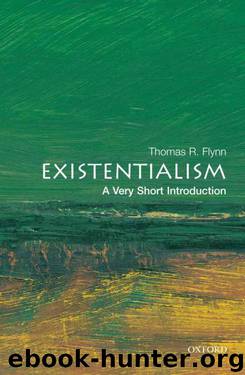Existentialism: a very short introduction by Thomas R. Flynn

Author:Thomas R. Flynn [Flynn, Thomas R.]
Language: eng
Format: epub
Tags: Philosophy, History & Surveys, General, Modern, Existentialism, Movements
ISBN: 9780192804280
Publisher: Oxford University Press US
Published: 2006-11-24T10:20:06.703000+00:00
Chapter 5 A chastened individualism? Existentialism and social thought
In history too, existence precedes essence. Jean-Paul Sartre
It may be shameful to be happy by oneself.
Albert Camus, The Plague
When Sartre entered the lecture hall on that October evening of 1945, he was facing the widespread belief that his newly popular philosophy was simply a warmed-up version of bourgeois individualism, totally insensitive to the mortal camaraderie that had just defeated Fascism across the continent. This suspicion was confirmed by the often-quoted penultimate line of his play No Exit, ‘Hell is other people’ (L’enfer c’est les autres), that was premiered the year before. The outburst of Sartre’s creativity that followed the liberation of Paris seemed to reinforce the implicit narcissism of his ethic of authenticity and critique of bad faith, neither of which addressed pressing social issues. This was certainly the view of both his Communist and his Catholic critics, well represented at that lecture, both of whom championed explicit, if mutually incompatible, theories of social justice and programmes to implement them. And yet what we have been calling the existentialist tradition, notwithstanding its stress on becoming an individual, was uniformly critical of bourgeois society with its penchant for conformity and material comfort, its pursuit of security and aversion to risk, and its unimaginative conservatism. But does this translate into a full-blown social theory, especially one that recognizes exploitation and oppression and advocates their termination? I’ll respond by examining the respective answers of the leading members of that tradition.
Kierkegaard and Nietzsche on bourgeois culture
I pointed out earlier that Kierkegaard is noted for his polemics against the three formative institutions of Danish society in his day, namely Hegelian philosophy, the established Church, and the popular press. Hegelian philosophy, in his view, had traded life for concept (Begriff). He agreed with what was then the dominant school of thought in Denmark that life was to be understood ‘historically’ in the sense that the Hegelian system could uncover the necessities of events after they had occurred. But he insisted that such speculation was powerless before the contingencies of life as it is lived.
It is perfectly true, as philosophers say, that life must be understood backwards. But they forget the other proposition, that it must be lived forwards.
(Journals, 1843)
Ideas can be systematized, life cannot. Attempting to live your life by relying on abstract, Hegelian philosophy, Kierkegaard scoffed, is like taking your laundry to a shop that announces ‘Washing Done’ and discovering that only the sign is for sale!
But the established Lutheran Church did not fare any better. Undertaking the project of reintroducing Biblical ‘Christianity’ into ‘Christendom’, Kierkegaard identified the latter with a cultural Christianity that promoted complacency, greed, and tokenism towards the poor and suffering while profiting from its identification with the political and economic powers of the day. He noted that the State employs a thousand officials (the clergy) who, while professing Christianity, in fact are interested only in their incomes and actually prevent people from knowing what Christianity truly is. Though his brother was a pastor
Download
This site does not store any files on its server. We only index and link to content provided by other sites. Please contact the content providers to delete copyright contents if any and email us, we'll remove relevant links or contents immediately.
Waking Up in Heaven: A True Story of Brokenness, Heaven, and Life Again by McVea Crystal & Tresniowski Alex(37745)
Still Foolin’ ’Em by Billy Crystal(36312)
Cecilia; Or, Memoirs of an Heiress — Volume 1 by Fanny Burney(32509)
Cecilia; Or, Memoirs of an Heiress — Volume 2 by Fanny Burney(31918)
Cecilia; Or, Memoirs of an Heiress — Volume 3 by Fanny Burney(31901)
Fanny Burney by Claire Harman(26570)
Empire of the Sikhs by Patwant Singh(23040)
We're Going to Need More Wine by Gabrielle Union(19006)
Hans Sturm: A Soldier's Odyssey on the Eastern Front by Gordon Williamson(18542)
Plagued by Fire by Paul Hendrickson(17377)
Out of India by Michael Foss(16824)
All the Missing Girls by Megan Miranda(15810)
Cat's cradle by Kurt Vonnegut(15273)
Pimp by Iceberg Slim(14446)
Molly's Game by Molly Bloom(14113)
Bombshells: Glamour Girls of a Lifetime by Sullivan Steve(14026)
For the Love of Europe by Rick Steves(13689)
Leonardo da Vinci by Walter Isaacson(13248)
4 3 2 1: A Novel by Paul Auster(12341)
